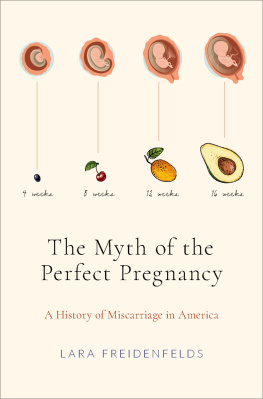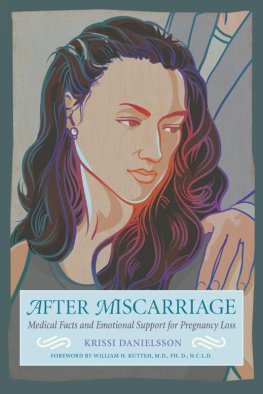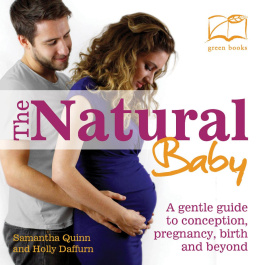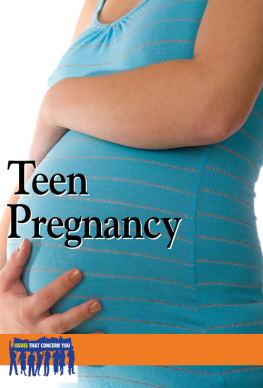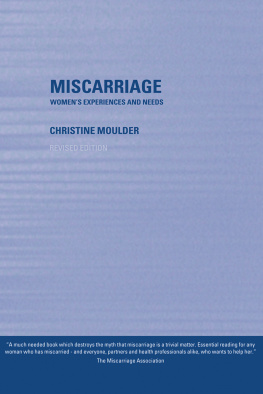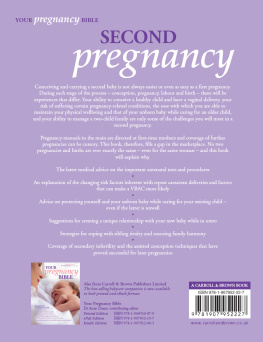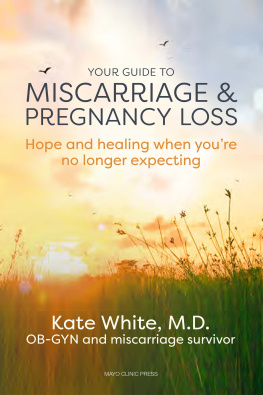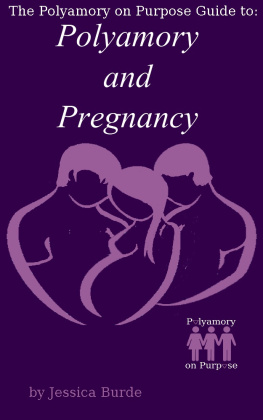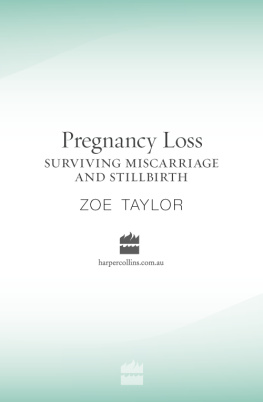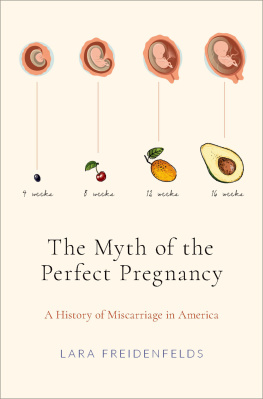The Myth of the Perfect Pregnancy

Oxford University Press is a department of the University of Oxford. It furthers the Universitys objective of excellence in research, scholarship, and education by publishing worldwide. Oxford is a registered trade mark of Oxford University Press in the UK and certain other countries.
Published in the United States of America by Oxford University Press
198 Madison Avenue, New York, NY 10016, United States of America.
Lara Freidenfelds 2020
All rights reserved. No part of this publication may be reproduced, stored in a retrieval system, or transmitted, in any form or by any means, without the prior permission in writing of Oxford University Press, or as expressly permitted by law, by license, or under terms agreed with the appropriate reproduction rights organization. Inquiries concerning reproduction outside the scope of the above should be sent to the Rights Department, Oxford University Press, at the address above.
You must not circulate this work in any other form and you must impose this same condition on any acquirer.
CIP data is on file at the Library of Congress
ISBN 9780190869816
eISBN 9780190869830
For my family
Contents
Books may have single authors, and yet they emerge from communities. I thank the many communities who have supported my efforts, pushed my thinking, and produced the marvelous scholarship I have built my work upon.
Thank you to the Mellon Foundation, the Newhouse Center for the Humanities, and the Department of Womens and Gender Studies at Wellesley College for the postdoctoral fellowship that grounded my research, and the warm and stimulating collegiality of faculty and fellows, especially Susan Reverby, Rosanna Hertz, Charlene Galarneau, Tim Peltason, John Burt, Sarah Bishop, Nathaniel Scheidley, Sarah Wall-Randall, and the members of Feminist Inquiry. Thank you to the Hagley Museum and Archive, especially Erik Rau, Roger Horowitz, and Carol Lockman, for a Hagley Exploratory Grant that allowed me sustained access to their wonderful collection. I am grateful to archivists David Rose at the March of Dimes archive; Russell Johnson at the University of California at Los Angeles Biomedical Sciences Library archive; and Alison Kotch at Meredith Publishing, for facilitating my access to the American Baby magazine archive. Thank you to the Princeton Research Forum for the support of a Frances C. Hunter Presentation Grant and sustained moral and intellectual support for independent scholarhood, and thanks especially to my PRF indy scholar mentor, Karen Reeds, who has been generous with clever and insightful ideas, good humor, and lunch dates. Thanks to the Chatham Public Library staff for graciously filling many years worth of ILL requests, and to Chatham, Morris County, and the state of New Jersey for supporting a robust and research-worthy library system. Thank you to research assistants extraordinaire Wei-Ying Wang and Alexandra Pollock.
I thank my colleagues all over the country who invited me to speak and gave me thoughtful and well-informed feedback without fail: the University of California at Los Angeles History of Science, Technology and Medicine Colloquium; the University of California at Berkeley Gender and Science Program; the Yale University History of Science and Medicine Colloquium; University of Pennsylvanias symposium in honor of Ruth Schwartz Cowan; Rutgers Universitys Symposium on Maternal and Fetal Bodies; Kansas University Medical Centers Don Carlos Peete Lecture; the Bates Nursing History Center at the University of Pennsylvania; the Hagley Museum Research Seminar (especially commentator Amy Bentley); The Hastings Center; the Schlesinger Library at the Radcliffe Institute, Harvard University; and the University of Nebraska at Lincoln Linda and Charles Wilson Humanities in Medicine Lecture. Thank you to the American Association of the History of Medicine, my scholarly home base, whose members have provided brilliant scholarship, camaraderie, and many years feedback on my work in formal presentations and hallway conversations alike. Thank you also to my colleagues at the Society for the History of Technology and the Berkshire Conference on the History of Women for their helpful feedback on conference papers.
A huge thanks to the people who read part or all of my manuscript and generously shared critiques and ideas. The Independent Women Scholars Salon has been the center of my intellectual and writing life for over a decade and a constant source of good cheer, smart ideas, careful critiques, and pushes to think bigger. I thank these amazing IWSS swashbucklers: Joy Harvey, Rachael Rosner, Kara Swanson, Conevery Bolton Valencius, Kate Viens, Nadine Weidman, Ilyon Woo, Susan Lanzoni, Deborah Weinstein, Martha Gardner, and Monique Tello. Cara Kiernan Fallon is my NYC writing and lunch buddy, and I am grateful for her perceptive insights and cogent edits on the entire manuscript. I thank journalist and historian Randi Epstein for her helpful feedback on the whole manuscript and many fun and collegial lunches. Thank you also to Laurel Thatcher Ulrich, Katharine Park, Charis Thompson, Johanna Schoen, Chris Crenner, Ziv Eisenberg, Shannon Wythecombe, Allan Brandt, Erik Parens, Rose Holz, Emily Abel, John Freidenfelds, Kelly Freidenfelds, Lucy Freidenfelds, Jason Freidenfelds, and Sabrina Freidenfelds for crucial feedback on part or all of the manuscript and key, insightful conversations that shaped my arguments. Thank you to my agent, Lisa Adams, and my editor, Susan Ferber, for tweaking my words in just the right ways and advocating for my research and my message, and the peer reviewers at Oxford University Press for their clarifying questions and generous feedback.
Thank you to my playground communities at the Child Study Center at Wellesley College, Sprout House in Chatham, New Jersey, Washington Avenue School, and my Moms Group in Berkeley. There are a lot of wise parents out there, and I was privileged to spend many hours learning from them while we watched our kids together. Thanks especially to Victoria Budson, who inspired me with her example of how feminist work and caring for family go together and who taught me how to shape my own narrative. Thank you also to the teachers and babysitters who helped me balance writing and child care and loved and educated my children in equal measure, especially Renee Blanchard, Julia Friedman, Claire Thoma, and Caitlin McGlynn.
This book is dedicated to my family. My parents, John and Lucy Freidenfelds, my in-laws, Amy and Andy Wu, my siblings and siblings-in-law, Kelly Freidenfelds, David Brown, Jason and Sabrina Freidenfelds, Fran Wu-Giarratano and Paul Giarratano: you are my treasured parenting companions and role models. I am so lucky to have you. My spouse, Felix Wu: you are my partner in everything, the love of my life, and I cant imagine doing any of it without you. The kiddosall my wonderful nieces and nephews, and my dear children Sebastian and Oliveryou are the reason for it all, and you make the effort worthwhile. I am so glad to be a part of your growing up.
The Myth of the Perfect Pregnancy
Posted about two months into her pregnancy, Malones announcement was a sweet thumbnail romance. Lovingly illustrated, it began with childhood photos of her and her husband, a Little Leagueplaying Indiana boy destined from birth to meet a sparkly dresswearing girl from Ohio. Twenty-something years laterthey met, fell madly in love, and got married. Tongue in cheek, Malone described a happy family of four, above a picture of her and her husband with the dogs they each brought to the marriage. And now sometime around October 15th, 2011that family of four will become a family of five. No, were not getting another dog (lord help us)were having a

